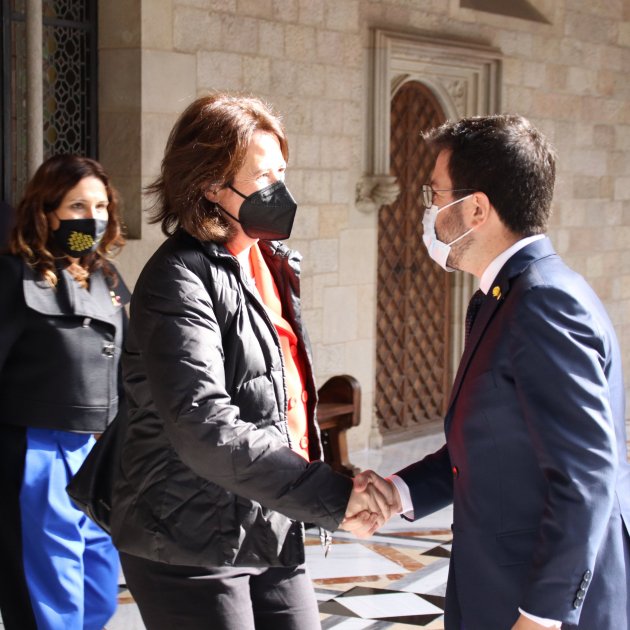Third time lucky. The Catalan president, Pere Aragonès, has finally managed, after two days of crossing out proposed meetings on his agenda, to launch the round of contacts he announced as an initiative to rebuild the unity of the independence movement. Not so lucky, however, to have started the series of encounters at a time of intense tension among the Catalan independence groups, after the confrontation that took place yesterday in Parliament following the banning of the CUP deputy Pau Juvillà from holding public office. Aragonès's first meeting was with the Òmnium Cultural president, Jordi Cuixart, and then, with the president of the Catalan National Assembly (ANC), Elisenda Paluzie. Cuixart took refuge in the fact that he is only acting president, as a result of the electoral process which the leading Catalan cultural group has underway, and avoided appearing before the press. Not so with Paluzie. "We are still without a plan for reaching independence," she said, so situations like the one experienced yesterday in Parliament "turn into a Dantesque spectacle."
Indeed, if the meetings are aimed at reducing the internal divisions in the independence movement, this was precisely the problem that had prevented the earlier meetings from taking place on Wednesday and Thursday as planned. On Wednesday, the CUP stood up Aragonès an hour before the meeting following the arrest by the Mossos police of four housing activists and criticised him in a statement that denounced "the focus of the legislature in the current ERC and JxCat government". Meetings with the representatives of Junts and ERC were scheduled for Thursday, but negotiations for the Juvillà case meant they had to be called off, as the plenary session of Parliament took place on Thursday and not on Friday as initially planned.
Dialogue table: "very negative"
Appearing after the meeting with Aragonès, Paluzie reiterated the criticisms she had made to the president. "We called for a radical change of direction in terms of the strategy of the pro-independence majority," said the ANC president, who has repeatedly insisted on seeking a "turning point." She complained that in four years "nothing has been done and no progress has been made", and warned that it was necessary to "have a plan". She blamed the government's strategy for dialogue, gave a "very negative" assessment of the results of the negotiating table with the government of Pedro Sánchez, and warned that this commitment, made by ERC with the Spanish Socialists, had severely eroded the independence movement.
The ANC leader did not go into detail on the details of the roadmap to independence she would like to see, but stressed that the experience of the 1st October shows that the key thing is to have the capacity to sustain the challenge over time and push it forward. She regretted that in 2017 the independence movement did not step up to "the battle", and warned that a withdrawal makes it necessary to, first, regain strength, and then, to be clear what fights to enter, in order not to be beaten by attrition.
Sensation of withdrawal
Paluzie lamented the setbacks that the Catalan independence movement has had over the past four years - "we can't let them gain ground from us", she warned - and admitted that although "the conditions for a declaration of independence are not present, we must stop this sensation of withdrawal, of being on the defensive, that the state is gaining ground in every decision it makes."
As for the tension that was experienced yesterday in Parliament, she avoided singling out the speaker, Laura Borràs, for the decision to leave Juvillà without a seat, recalling other similar episodes that occurred in the previous legislature with the disqualification of Quim Torra and the withdrawal of the salaries of the political prisoners, but she did admit that "this degrades the institution and the trust of the citizens in their representatives."
Paluzie warned of the discouragement that these situations create in pro-independence ranks, called for clarity from political leaders and expressed confidence that this week as a result of the crisis, disagreements between pro-independence groups "have hit rock bottom" and that it marked a "turning point, to get more serious".
At the end of the ANC president's appearance, the Catalan minister of the presidency, Laura Vilagrà, who also took part in the meeting, also appeared before the press. Vilagrà asserted that repression must not divide independence and demanded "anti-repression unity and acting proactively, not reactively". Aragonès plans to resume the meetings with the three pro-independence parties that had to be postponed next week, possibly on Monday. The intention is, at the conclusion of these meetings, to present his proposal for moving towards independence - in a conference on February 14th.
